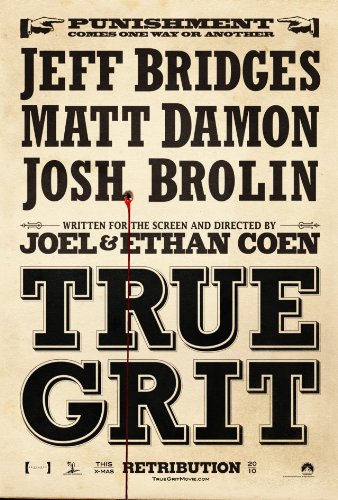All Nonfiction
- Bullying
- Books
- Academic
- Author Interviews
- Celebrity interviews
- College Articles
- College Essays
- Educator of the Year
- Heroes
- Interviews
- Memoir
- Personal Experience
- Sports
- Travel & Culture
All Opinions
- Bullying
- Current Events / Politics
- Discrimination
- Drugs / Alcohol / Smoking
- Entertainment / Celebrities
- Environment
- Love / Relationships
- Movies / Music / TV
- Pop Culture / Trends
- School / College
- Social Issues / Civics
- Spirituality / Religion
- Sports / Hobbies
All Hot Topics
- Bullying
- Community Service
- Environment
- Health
- Letters to the Editor
- Pride & Prejudice
- What Matters
- Back
Summer Guide
- Program Links
- Program Reviews
- Back
College Guide
- College Links
- College Reviews
- College Essays
- College Articles
- Back
True Grit MAG
The heft of the Coen brothers' name in the filmmaking community can be attributed to their infamous disregard for convention. It has worked for them for more than 20 years, and in “True Grit,” it works again. Despite being adapted from the 1969 John Wayne classic, it is an altogether novel Western, saturated with a hearty dose of the Coens' trademark ingredients.
The movie opens on a porch with snow cascading gently in the lamp glow. A body is slumped outside, and Mattie Ross (Hailee Steinfeld) informs us that her dad was shot and killed by Tom Chaney, a man who became desperate at the idea of being cheated. He stole her father's horses and fled into Indian territory.
Mattie is a scrawny 14-year-old with gusto, a dignified young woman bent on avenging her father's murder. She is quick-tongued, knowledgeable of legal proceedings, and determined. She hires a bounty hunter to help her capture Chaney. Rooster Cogburn (Jeff Bridges) is a U.S. Marshall with alcohol, cigarettes, and upwards of 23 dead men under his belt. A Texas Ranger, La Boeuf (Matt Damon), pronounced “La Beef,” joins the manhunt, having been sent to capture Chaney, who is also charged with shooting a Texas senator. The three embark on their quest into no man's land.
Moviegoers agree that the Coen brothers have a knack for dialogue. Not only is “True Grit” written in a thoroughly convincing dialect, but it's laced with deadly wit and comedy. Contrary to the impression given by the trailer, which practically waves a flag declaring action-movie status, this Western is driven not by buckshot and gun smoke but by the dexterity of the tongue.
The precise casting lends much to the effect. Bridges proves himself a formidable character actor, becoming Rooster Cogburn for an hour and 50 minutes. He slurs and growls almost incoherently, making many of his lines classic. Steinfeld and Damon also immerse themselves in their roles, convincingly sharp-minded and pompous, respectively. By combining rhetorical superiority with tints of screwball humor (a vintage Coen device), “True Grit” emerges as a high-class comedy.
“True Grit” is also comedic on another level seen in few movies. I mentioned the Coen's unconventionality; here is where it shines. In the vein of the Coens' “A Serious Man,” “True Grit” incorporates cosmic irony into its storytelling. Its tale is one of revenge, yet there is little indication of the fiery passion or emotional propaganda seen in traditional similar-themed films. Indeed, we never meet Mattie's father. So, already, we are disconnected emotionally from her plight. There is no overwhelming sense of empathy or hunger for justice. Throughout the movie, Mattie treats her goal objectively, prioritizing logistics over brooding.
Note, too, the soundtrack, which is composed largely of Christian chorales, a sharp contrast to the cold-blooded vice at hand, one that is curiously mitigated as a result. Such ironies exist throughout much of the film.
The Coen brothers have, in one sense, accomplished a remarkable feat. “True Grit” transcends its origins. It is a revenge tale about the futility of revenge, a Western without heroism or a pat conclusion, and a wry comedy smirking at its ironies. One problem is that, by taking such dramatic liberties, the Coens have effectively diminished the movie's impact. Consider James Mangold's 2007 “3:10 to Yuma” adaptation. Its story is old-fashioned, but it rings with a deep sincerity and emotional richness that sings to its audience. “True Grit” is one fine movie, but in the end, the soul is left the wrong side of satisfied.
Similar Articles
JOIN THE DISCUSSION
This article has 2 comments.
This was a very well-written review. I agree with you on most points; this was an excellent movie, and the script and acting were especially good. However, I wouldn't call the ending anticlimactic, necessarily. Maybe the point is that in the end Mattie is essentially alone, without any true hero, and that is fine with her. And the unusual ending was designed specifically to stick in the viewer's mind. I agree, though, I would have done it a little differently. (LaBeouf certainly needed more closure.) The last scene of the movie was also very similar to the last scene of the novel.
Anyway. Really good review! I'm getting an account on here soon and am considering doing a review of the book.
